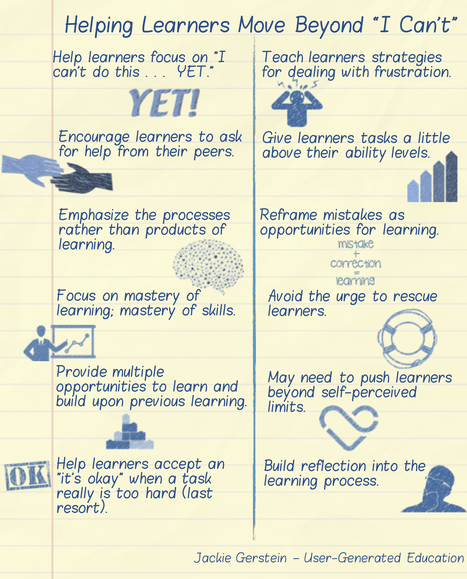I work part-time with elementary learners – with gifted learners during the school year and teaching maker education camps during the summer. The one thing almost all of them have in common is yelling out, “I can’t do this” when the tasks aren’t completed upon first attempts or get a little too difficult for them. I partially blame this on the way most school curriculum is structured. Too much school curriculum is based on paper for quick and one shot learning experiences (or the comparable online worksheets). Students are asked to do worksheets on paper, answer end-of-chapter questions on paper, write essays on paper, do math problems on paper, fill in the blanks on paper, and pick the correct answer out of a multiple choice set of answers on paper. These tasks are then graded as to the percentage correct and then the teacher moves onto the next task.
So it is no wonder that when learners are given hands-on tasks such as those common to maker education, STEM, and STEAM, they sometimes struggle with their completion. Struggles are good. Struggles with authentic tasks mimics real life so much more than completing those types of tasks and assessments done at most schools.
Problems like yelling out, “I can’t do this” arise when the tasks get a little too difficult, but ultimately are manageable. I used to work with delinquent kids within Outward Bound-type programs. Most at-risk kids have some self-defeating behaviors including those that result in personal failure. The model for these types of programs is that helping participants push past their self-perceived limitations results in the beginnings of a success rather than a failure orientation. This leads into a success building upon success behavioral cycle.

|
Rescooped by John Evans from Professional Learning for Busy Educators |

Amrika Nicole's curator insight,
December 10, 2017 7:18 PM
Module 2: Conceptualizations of Giftedness and Talent
The power of "yet" in schools and growth mindset is taking off. This year I have created a bulletin board with commonly used phrases that students have used and have changed them to the growth mindset phrase that would go along with it. I think before you can expect your students to have this growth mindset the staff has to believe and use it too. We have spent part of a PD talking about phrases that we use as teacher to make them growth mindset.
Sign up to comment



 Your new post is loading...
Your new post is loading...






